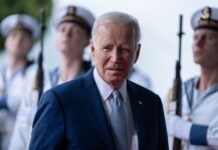
In the heart of the Lone Star State, a fierce debate has been rekindled as Governor Greg Abbott takes a resolute stand against the federal government’s border policies. The recent clash over the installation and subsequent removal of razor wire along the Texas-Mexico border by U.S. Border Patrol has sparked not just a political standoff but also renewed calls for Texan independence.
The Supreme Court’s decision last month, which sided with the Biden administration in deeming the wire a hazard, was met with defiance from Abbott. In a move that skirts the edges of the court’s ruling, new barriers were promptly erected, signaling the state’s unwavering commitment to securing its borders. This act of resistance has amplified the voices of those who believe Texas should assert its sovereignty and consider secession.
Rock LEGEND Ted Nugent goes OFF on scorched earth rant against Joe Biden after targeting Texas for securing border at Trucker Convoy:
"I'd like to apologize on behalf of 'We the people' for allowing this piece of s**t to get in the White House."🔥pic.twitter.com/pu83ntlaOT
— Benny Johnson (@bennyjohnson) February 2, 2024
Supporters of the Texas Nationalist Movement (TNM) have seen a surge in interest following these events. Daniel Miller, leader of the TNM, asserts that the border dispute has highlighted the fractured relationship between Texas and Washington, D.C., and predicts that independence could be realized within the next three decades. This sentiment is echoed by Texans who feel their state’s needs and security concerns are being neglected by the federal government.
However, the path to independence is fraught with legal and political obstacles. Experts argue that secession is constitutionally impossible, citing an 1869 Supreme Court ruling and the words of the late Justice Antonin Scalia, who affirmed that the Civil War settled the question of a state’s right to secede. Despite this, the TNM and its supporters remain undeterred, believing that the Constitution does not explicitly forbid secession.
The Trucker Convoy is in Texas and on its way to Eagle Pass. pic.twitter.com/JuOgKAU1UG
— Citizen Free Press (@CitizenFreePres) February 2, 2024
The idea of an independent Texas, complete with its own military and possibly its own currency, is a vision that resonates with some within the business community. Businessman David Roberts has publicly stated that an autonomous Texas could become a bastion of economic freedom, free from federal taxes and regulations. This perspective is attractive to those who envision Texas as a thriving economic powerhouse on its own terms.
Yet, the notion of independence is not without its critics. Joshua Blank, research director of the Texas Politics Project, suggests that while the current conflict may intensify support among existing proponents of independence, it is unlikely to convert others to the cause. Moreover, a University of Texas and Texas Tribune poll from 2014 found that a majority of Texans identify as American first, indicating that patriotism remains deeply ingrained in the state’s political culture.
As the debate continues, it is clear that the border standoff has brought national attention to the issue of Texan independence. While the movement may face significant legal challenges and lack majority support, the determination of its advocates cannot be underestimated.
Whether or not Texas will ever take the bold step toward secession remains uncertain, but the conversation about the state’s future and its place within the Union is more alive than ever.












